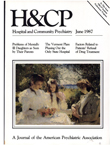Time-Limited Psychiatric Hospitalization of Children: A Model and Three-Year Outcome
Abstract
Current emphasis on reducing length of hospital stay has stimulated a review of the philosophical, clinical, and administrative approaches to brief psychiatric hospitalization of children. A model of time-limited hospitalization on an eight-bed children's unit was designed to stabilize the patients and triage them back to appropriate levels of community aftercare within 28 days. Clinical and administrative strategies used to facilitate this process included a community-based case managerm for each patient, focused clinical intervention, and strong parent involvement. The treatment model was generally successful in meeting the goals of hospitalization. Of 212 admissions over three years, 37 percent of the patients at discharge continued to need complex, multimodal treatments, and 63 percent were referred for less intensive outpatient care.
Access content
To read the fulltext, please use one of the options below to sign in or purchase access.- Personal login
- Institutional Login
- Sign in via OpenAthens
- Register for access
-
Please login/register if you wish to pair your device and check access availability.
Not a subscriber?
PsychiatryOnline subscription options offer access to the DSM-5 library, books, journals, CME, and patient resources. This all-in-one virtual library provides psychiatrists and mental health professionals with key resources for diagnosis, treatment, research, and professional development.
Need more help? PsychiatryOnline Customer Service may be reached by emailing [email protected] or by calling 800-368-5777 (in the U.S.) or 703-907-7322 (outside the U.S.).



